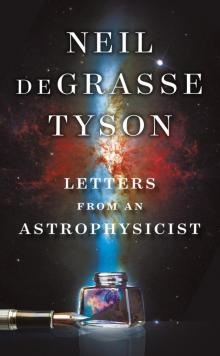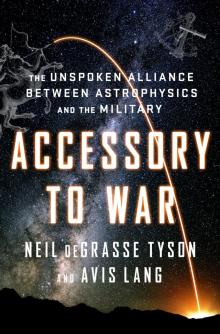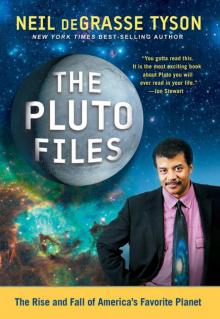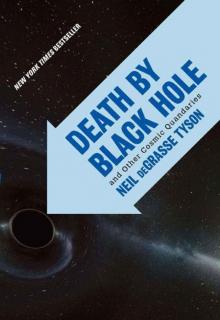- Home
- Neil DeGrasse Tyson
Letters from an Astrophysicist
Letters from an Astrophysicist Read online
SELECTED OTHER TITLES BY NEIL DEGRASSE TYSON
Accessory to War: The Unspoken Alliance Between Astrophysics and the Military (2018)
With Avis Lang
Astrophysics for People in a Hurry (2017)
StarTalk: The Book (2016)
With Charles Liu and Jeffrey Lee Simons
Welcome to the Universe: An Astrophysical Tour (2016)
With Michael A. Strauss and J. Richard Gott III
The Inexplicable Universe (2012)
A six-part video lecture series
Space Chronicles: Facing the Ultimate Frontier (2012)
Edited by Avis Lang
The Pluto Files: The Rise and Fall of America’s Favorite Planet (2009)
Death by Black Hole: And Other Cosmic Quandaries (2007)
Origins:
Fourteen Billion Years of Cosmic Evolution (2004)
With Donald Goldsmith
Letters
from an
Astrophysicist
NEIL DEGRASSE TYSON
To my mother, who first taught me how to write with meaning and impact. And to my father, whose life experience navigating people, places, and things conferred upon me the necessary wisdom to navigate a life of my own.
If in this I have been tedious, it may be some excuse, I had not time to make it shorter.
—WILLIAM COWPER, 1704
CONTENTS
Preface
Prologue A Memoir, of Sorts
I. Ethos
The characteristic spirit of a culture, manifested in its beliefs and aspirations.
Chapter 1Hope
Chapter 2Extraordinary Claims
Chapter 3Musings
II. Cosmos
The universe seen as a well-ordered whole.
Chapter 4Hate Mail
Chapter 5Science Denial
Chapter 6Philosophy
III. Pathos
A plaintive appeal to emotions that already reside within us.
Chapter 7Life and Death
Chapter 8Tragedy
Chapter 9To Believe or Not to Believe
IV. Kairos
A propitious moment for decision or action.
Chapter 10School Days
Chapter 11Parenting
Chapter 12Rebuttals
EpilogueA Eulogy, of Sorts
Acknowledgments
Index of Subjects
PREFACE
Now that people communicate with one another primarily by social media, letter-writing has become a lost art. The greatest casualty may be our growing inability to find words that precisely communicate our feelings and emotions. Why else the need for that burgeoning catalog of emoticons to supplement our written correspondence? A smiley face. A snarky face. A heart. A thumbs-up. But when the world stimulates your curiosity; when your state of not knowing leaves you restless; when your existential angst overflows; sometimes you just have to write a full-up letter to somebody.
Contained herein is a sampling of my correspondence, almost all with complete strangers, spanning more than two decades, with most letters selected from a ten-year period when my email address was publicly accessible.* Over that time, most inquiries contained straightforward questions of science. Those were fielded by expert staff at New York City’s Hayden Planetarium, where I serve as director. Other letters, mostly of a personal nature, including those with specific reference to a speech I had given, a book I have written, or a video in which I appeared, form the corpus of letters from which my responses are drawn.
The letters to me that communicate significant emotion, curiosity, or anxiety are reproduced in full.† Other letters, of the rambling type, I summarize for brevity in a single paragraph. Some letters are written by people who are angry with the world or with something I have said or done. Others explore ideas and beliefs. Still others are sad, sensitive, and poignant. And in many cases there’s a longing we’ve all experienced at one time or another: the search for meaning in our lives; an evergreen urge to understand one’s place in this world and in this universe.
Added, too, are letters I’ve written, not to anybody but to everybody. These include letters to the editor, mostly of the New York Times, as well as open letters posted to my Facebook page and other public places on the internet. One of the earliest dates back to my overlong September 12, 2001, letter to family and colleagues, twenty-four hours after I bore witness, from a distance of four blocks, to the attack and collapse of the World Trade Center’s Twin Towers.
Above all else, Letters from an Astrophysicist is a vignette of the wisdom I have mustered to teach, enlighten, and ultimately commiserate with the curious mind. It’s the world as viewed through the lens of an astrophysicist-educator. A world now shared with you.
* When a letter was received via means other than email (e.g., US “snail” mail or social media), that medium is indicated.
† When sensible, letters are lightly edited for spelling and grammar. Long letters are also edited for clarity and length. Meanwhile, zealous punctuation, when issued forth from EMOTION, is left largely intact!!!
Letters from an Astrophysicist
Prologue
A Memoir, of Sorts
Happy 60th Birthday, NASA
Monday, October 1, 2018
Facebook Note
Dear NASA,
Happy birthday! Perhaps you didn’t know, but we’re the same age. In the first week of October 1958, you were born of the National Aeronautics and Space Act as a civilian space agency, while I was born of my mother in the East Bronx. So the yearlong celebration of our shared sixtieth anniversary provides me a unique occasion to reflect on our past, present and future.
I was three years old when John Glenn first orbited Earth. I was seven when you lost astronauts Grissom, Chaffee, and White in that tragic fire of their Apollo 1 capsule on the launch pad. I was ten when you sent Armstrong and Collins to the Moon. And I was fourteen when you stopped going to the Moon altogether. Over that time I was excited for you and for America. But the vicarious thrill of the journey, so prevalent in the hearts and minds of others, was absent from my emotions. I was obviously too young to be an astronaut. But I also knew that my skin color was much too dark for you to picture me as part of this epic adventure. Not only that, even though you are a civilian agency, your most celebrated astronauts were military pilots, at a time when war was becoming less and less popular.
During the 1960s, the Civil Rights movement was more real to me than it surely was to you. In fact it took a directive from Vice President Johnson in 1963 to force you to hire black engineers at your prestigious Marshall Space Flight Center in Huntsville, Alabama. I found the correspondence in your archives. Do you remember? James Webb, then head of NASA, wrote to German rocket pioneer Wernher von Braun, who headed the Center and who was the chief engineer of the entire manned space program. The letter boldly and bluntly directs von Braun to address the “lack of equal employment opportunity for Negroes” in the region, and to collaborate with the area colleges Alabama A& M and Tuskegee Institute to identify, train, and recruit qualified Negro engineers into the NASA Huntsville family.
In 1964, you and I had not yet turned six when I saw picketers outside the newly built apartment complex of our choice, in the Riverdale section of the Bronx. They were protesting to prevent Negro families, mine included, from moving there. I’m glad their efforts failed. These buildings were called, perhaps prophetically, the “Skyview Apartments,” on whose roof, 22 stories over the Bronx, I would later train my telescope on the universe.
My father was active in the Civil Rights movement, working under New York City’s Mayor Lindsay to create job opportunities for youth in the ghetto—as the “inner
city” was called back then. Year after year, the forces operating against this effort were huge: poor schools, bad teachers, meager resources, abject racism, and assassinated leaders. So while you were celebrating your monthly advances in space exploration from Mercury to Gemini to Apollo, I was watching America do all it could to marginalize who I was and what I wanted to become in life.
I looked to you for guidance, for a vision statement that I could adopt that would fuel my ambitions. But you weren’t there for me. Of course, I shouldn’t blame you for society’s woes. Your conduct was a symptom of America’s habits not a cause. I knew this. But you should nonetheless know that among my colleagues, I am the rare few in my generation who became an astrophysicist in spite of your achievements in space rather than because of them. For my inspiration, I instead turned to libraries, remaindered books on the cosmos from bookstores, my rooftop telescope, and the Hayden Planetarium. After some fits and starts through my years in school, where my ambitions seemed at times to be the path of most resistance through an unwelcoming society, I became a professional scientist. I became an astrophysicist.
Over the decades that followed you’ve come a long way. Whoever does not yet recognize the value of this adventure to our Nation’s future, soon will, as the rest of the developed and developing world passes us by in every measure of technological and economic strength. Not only that, these days you look much more like America—from your senior-level managers to your most decorated astronauts. Congratulations. You now belong to the entire citizenry. Examples of this abound, but I especially remember when the public took ownership of the Hubble Telescope, your most beloved unmanned mission. They all spoke loudly back in 2004, ultimately reversing the threat that the Telescope might not be serviced a fourth time, extending its life for another decade. Hubble’s transcendent images of the cosmos had spoken to us all, as did the personal profiles of the Space Shuttle astronauts who deployed and serviced the telescope, and the scientists who benefited from its data stream.
Not only that, I had even joined the ranks of your most trusted, as I served dutifully on your prestigious Advisory Council. I came to recognize that when you’re at your best, nothing in this world can inspire the dreams of a Nation the way you can—dreams fueled by a pipeline of ambitious students, eager to become scientists, engineers, and technologists in the service of the greatest quest there ever was. You have come to represent a fundamental part of America’s identity, not only to itself but to the world.
So as we both turn sixty, and begin our sixty-first trip around the Sun, I want you to know that I feel your pains and share your joys. And I look forward to seeing you back on the Moon. But don’t stop there. Mars beckons, as do destinations beyond.
Birthday buddy, even if I have not always been, I am now and ever more your humble servant.
Neil deGrasse Tyson
New York City
I.
Ethos
The characteristic spirit of a culture, manifested in its beliefs and aspirations.
Chapter 1
Hope
It’s all you have when you realize you are not entirely in control of outcomes. But without it, how else do we cope with the challenges of life?
Coma
Sunday, February 25, 2007
Dear Mr. Tyson,
I have long suspected that we do live in a universe that wants to kill us, so I am not surprised you say this in your talks, but where is the hope, or isn’t there any?
I spent 13 days in a coma in 2001 and miraculously returned to life to continue with my dear husband. He sang me a love song and invited me to return, and I opened my eyes and smiled at him. However, I am forever changed by the extent of information I came back with from that sojourn, and much of it was not good. Is the “not good” part the majority of what’s out there in your view? If so, how do you enjoy life, or don’t you?
Highest regards,
Sheila Van Houten
Dear Ms. Van Houten,
I see two kinds of hope. One of them is a kind of religious hope where one prays or performs some kind of cultural ritual for things to get better.
But there is another kind of hope—it’s the challenge of learning about the real world and using our intelligence to change things for the better. In this way, it’s the individual who is empowered to bring hope to the world.
So yes, the universe wants to kill us. But on the other hand, we all want to live. So let’s find a way together to deflect the asteroids, find the cure to the next lethal virus, mitigate hurricanes, tsunamis, volcanoes, etc. This can only be enabled by the efforts of a scientifically and technologically literate public.
Therein lies a hope on Earth far greater than ever promised by the act of prayer or introspection.
Sincerely,
Neil deGrasse Tyson
Fear
Sunday, July 5, 2009
Dear Mr. Tyson,
I just watched you on public television. I admire how far you have come in life. I have always tried to do what I could to help others. I am 38, a mother of three, and a full time student. I was born and raised in a small town of about 1500. When my marriage of 16 years fell apart, I decided to finish my Associate of Applied Science degree and apply at the University of Washington’s School of Social work.
I am moving to Snohomish on August 1st, and have no job, but have been applying to everything I can daily. It hit home when you talked about ambition. I have three kids to feed and all I want to do is work and go to school. My passion is to work in human services and I have done respite care and worked with the elderly, but will work in fast food to get to where I need to be.
I worry all the time that I won’t be able to provide for my children, and I am scared to death to move, but I won’t let that stop me. I don’t care if I have to re-apply to the UW every year until I am 70-years-old, I will attend and work my way to my master’s degree. I just don’t know how to get rid of this sick feeling in the pit of my stomach that I will move and fall flat on my face.
I have the drive and determination. I just need a break—not a free ride, just a job. I want nothing for free. I just want a job a chance to work my way through.
I don’t know why I am writing you. I don’t want anything, just someone to listen to my fears. I don’t have anyone to tell them to, and maybe you could understand.
Thank you for your time in reading this.
Lisa Kalma
Dear Lisa,
The people who fail in life are those whose ambitions were insufficient to overcome all the forces that work against them. And yes, failure is common to us all. But ambitious people use their failures as lessons to heed, as they push forward toward their goals.
Don’t fear change. Don’t fear failure. The only thing to fear is loss of ambition. But if you’ve got plenty of that, then you have nothing to fear at all.
Good luck on your journey, as I offer you the opening quote in my memoir, The Sky Is Not the Limit*
Beyond the judgments of others
Rising high above the sky
Lies the power of ambition
All the best, on Earth and in the universe.
Neil
Losing My Religion
Wednesday, April 29, 2009
Dear Dr. Tyson,
I grew up on a cattle farm in the rural mountains of North Carolina—and at times I used to think I was damned or disabled because the belief in a higher power just didn’t “click.” I went to church, Sunday school, and was surrounded by religion in every direction . . . yet something in me just kept asking questions.
I remember having to lie about my beliefs and wanting to give up (sometimes in tears) thinking if I lied about it enough I could eventually believe. I was kicked out of Sunday school for “asking too many questions.”
But then I started to discover others like myself (although much more intelligent and educated). I just wanted to thank you—your words can have so much more of an impact than you could fathom. You (and others) give peo
ple, who are isolated by geography, hope that they can stand firm in their non-beliefs and continue to ask questions. I know you are a scientist and a teacher—but to some people, you are hope.
George Henry Whitesides
Dear Mr. Whitesides,
Thanks for sharing your personal story.
It was (and is) never my intent to convert anybody’s belief system one way or another. My aim is simply to empower people to think for themselves, rather than to have others do the thinking for them. Therein blooms the “soul” of skepticism and the “spirit” of free inquiry.
I am happy to have nourished this growth within you.
As we say in the cosmos . . . Keep Looking Up.
Neil deGrasse Tyson
On Being Black
Marc saw the quality of my contributions as a good sign that times are changing, but he was sure that I had suffered, and continued to suffer, from racial bias and prejudice. He longed for the day when skin color became an irrelevant reference to a person’s identity. On Christmas Day 2008, he asked about my life experience as an African-American scientist.
Dear Marc,
Thanks for your note.
I am happy to report that references to me as a “black” scientist are, today, extremely rare—enough to surprise me that you make any mention of it at all. Of course, if your direct life experience suggests it, then I cannot reason it away, but other metrics remain strong indicators of my contention.
But let’s go back a few years. For example, in 2001, when I was appointed to a White House commission of 12 to study the future of the U.S. Aerospace Industry, some (especially critics of George W. Bush) were quick to say, “they needed a black person.” But when you actually looked at the commission membership, I was the only academic and I was not the only black person—another was a 4-star Air Force General. So the critique evaporated on analysis.

 Letters from an Astrophysicist
Letters from an Astrophysicist Accessory to War
Accessory to War The Pluto Files: The Rise and Fall of America's Favorite Planet
The Pluto Files: The Rise and Fall of America's Favorite Planet Death By Black Hole & Other Cosmic Quandaries
Death By Black Hole & Other Cosmic Quandaries